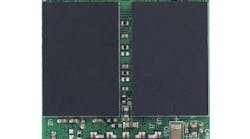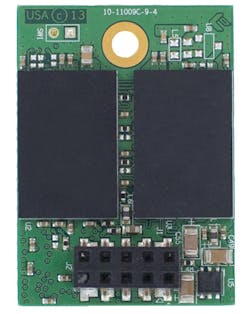Virtiumâs eUSB module is available with USB 2 and USB 3 interfaces.
Developers have a wide range of flash memory storage form factors. Conventional SATA-based solid state drives (SSDs) are one way to go, but they take up a good amount of space. The M.2 form factor has become more popular on consumer motherboards but it is not always a good choice for rugged, embedded applications because of mounting options. Likewise, many embedded applications require flash memory that has better reliability and lifetime than consumer applications.
One form factor that has garnered a good bit of interest for embedded applications is the Mini-PCI Express socket. It can support mSATA as well as USB and PCI Express-based flash memory. The challenge is finding motherboards with this type of socket and support.
A more common option is the ubiquitous USB header found on almost all motherboards. These can handle USB-based flash memory devices like Virtium’s new eUSB TuffDrive (see photo). The 36.9 × 26.6 mm module is available with USB 2 and USB 3.0 interfaces.
The challenge for developers will be finding a motherboard with a 10-pin that will handle Virtium’s USB 3.0 support. The typical 10-pin header provides USB 2.x interface that is slower than USB 3.0. The eUSB 3.0 interface runs at 4.8 Gbit/s.
Some motherboards provide a standard 20-pin USB 3.0 headers with a pair of interfaces. This is typically used to connect the motherboard to a pair of external USB 3.0 sockets. The 10-pin header is more compact, and Virtium’s version uses a single USB 3.0 interface. The advantage of customizing a motherboard is the much higher throughput.
One of the big advantages of the TuffDrive eUSB is its power requirements. It is under 1 W, which is half that of a typical SSD, and is available in capacities from 2 Gbytes up to 256 Gbytes. Developers have a choice of CE (MLC), XE (iMLC), and PE (SLC) classes. The module is designed to handle shock and vibration encountered in embedded applications. It is available in industrial temperature versions. SMART management support is standard, while AES encryption is optional. Pricing starts under $20.
Virtium provides developers with its vtView SSD Software. This enables configuration optimization that can be critical for many embedded applications.



